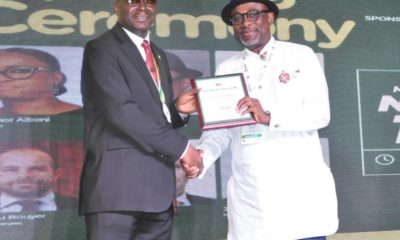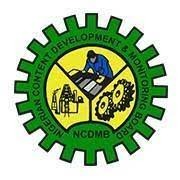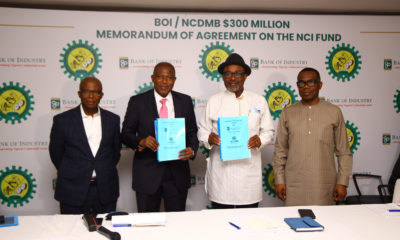Energy
NCDMB, NLNG to deepen partnership on projects, LPG penetration
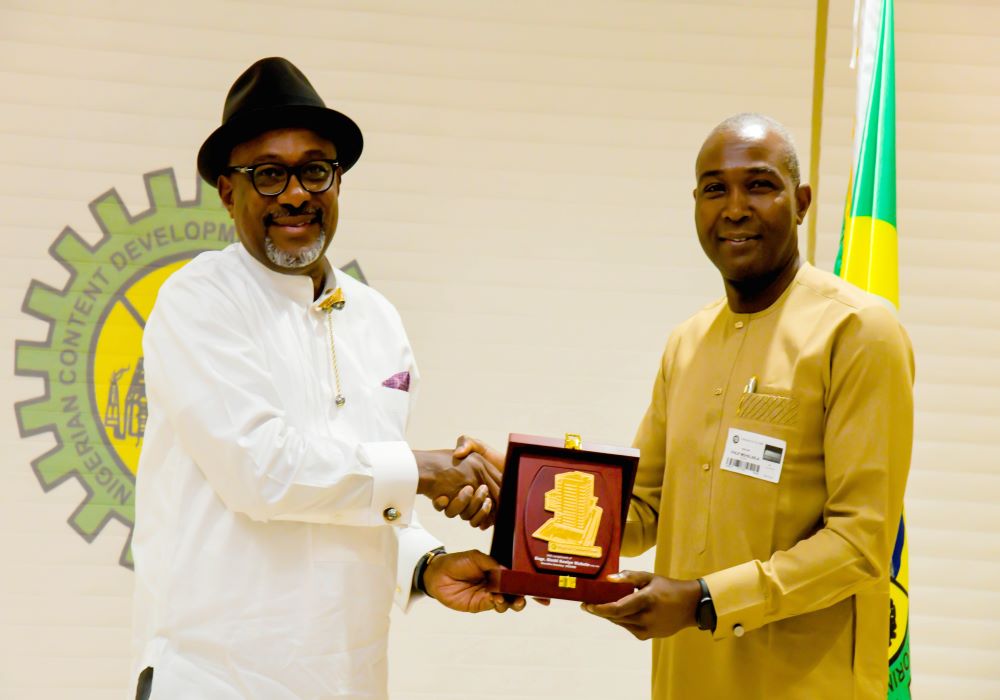
By John Mommoh
The Nigerian Content Development and Monitoring Board (NCDMB) and the Nigeria Liquified Natural Gas Limited will set up a tactical team comprising nominees from both organizations to drive closer collaboration on projects, ensure compliance with Nigerian Content obligations and promote other strategic alliances for the good of the nation’s economy.
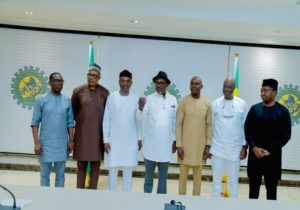
L-R: Director Finance & Personnel Management, NCDMB, Mr. Isaac Yalah; Director Monitoring & Evaluation, Mr. Akintunde Adelana; Deputy Managing Director Nigeria LNG, Mr. Olalekan Olufemi Ogunleye; Executive Secretary, NCDMB, Engr. Simbi Kesiye Wabote; Managing Director, Nigeria LNG Ltd, Dr. Philip Mshelbila and General Manager, External Relations & Sustainable Development, Mr. Andy Odeh at the courtesy visit of the Nigeria LNG management to the Nigerian Content Tower, Yenagoa, Bayelsa State.
This decision was reached on Wednesday when the Managing Director of Nigeria LNG Ltd, Dr. Philip Mshelbila led his management team to pay a courtesy visit to the Executive Secretary of the NCDMB, Engr. Simbi Kesiye Wabote at the Nigerian Content Tower, Yenagoa, Bayelsa State.
The Managing Director explained that the visit was conceived to introduce the company’s new management team to the NCDMB.
He stated that “NLNG and NCDMB have a special partnership that is beyond operator and regulator relationship. We started this relationship when we signed a Service Level Agreement (SLA) a few years ago and it put in place standards by which we would work together and ensure compliance and guard against surprises.”
He said the current plan is to take the relationship further and beyond complying with the provisions of the Nigerian Oil and Gas Industry Content Development (NOGICD) Act.
Read Also >> NCDMB Partnering Shell, Exxon, NAOC In Oil & Gas Parks – Wabote
He said the reason is that “NLNG has a vision not just to be a globally competitive NLNG business, but to help build a better Nigeria.
To do that we have to work closely with the NCDMB and raise our partnership to a new level, and that includes human development, research, and other areas.”
Speaking on the ongoing Train 7 LNG project, Mshelbila recalled how NCDMB supported the Nigeria LNG in various ways to enable the takeoff of the project.
He said: “The Final Investment Decision (FID) was taken successfully with the help of NCDMB and the project is now under construction, making good and safe progress.
We are looking at potentially 5000 to 10,000 persons being employed in different phases of the project. We already have thousands working on the ground. It is employing various contractors across different areas.
This is a true example of how local content should be.”
The Executive Secretary in his remarks commended Nigeria LNG for its impressive compliance with the provisions of the Nigerian Content Act, adding that the Board has continually fulfilled its obligations on the Service Level Agreement.
He expressed delight with the progress being made with the execution of the LNG Train 7 project, noting that it had reached about 30 percent completion.
He also stated that the worth of the Train 7 project is about $5bn, which represents a huge foreign direct investment (FDI) into the Nigerian economy.
Other economic benefits include the creation of 10,000 direct jobs and about 40,000 indirect employment opportunities.
He added: “There are also upstream projects that are currently being approved that will supply gas to Train 7. Those upstream projects will lead to an additional $6m foreign direct investment into the country.
This will create employment opportunities, touch the lives of families, raise the profile of the country as a major LNG LNG producer and increase our domestic LPG (cooking gas) production.
Train 7 is already providing a lot of jobs for Nigerian contractors, fabricators, logistics companies, and more. The benefits are enormous.”
He assured that the Board will continue to collaborate closely with Nigeria LNG, especially to ensure deeper LPG (cooking gas) penetration into the Nigerian market, hinting that NCDMB had partnered with several investors towards improving the accessibility of LPG.
Wabote also encouraged Nigeria LNG to consider further investments, highlighting that Qatar already had 14 LNG trains.
He said Nigeria needed to grow its LNG capacities, especially with the world’s clamour for energy transition and Federal Government’s declaration that gas is Nigeria’s transition fuel.
Energy
Shell Commends Oloibiri Lecture Series As Platform For Change

Shell Nigeria Exploration and Production Company Ltd (SNEPCo,) one of the sponsors of the Oloibiri Lecture Series and Energy Forum (OLEF) has commended it as a platform for driving change in Nigeria’s energy sector through the discussions that centre on business performance, cost discipline and process simplification.
“This event is special to the Shell brand, not only because of the nostalgia of Oloibiri but the quality of discourse it has enabled in our sector over the years,” SNEPCO Managing Director Ronald Adams said in a goodwill speech delivered by General Manager, Wells and Geosciences Operations Joe Mordi. He said: “We are grateful to the Society of Petroleum Engineers and our host the Petroleum Technology Development Fund (PTDF) for another successful outing.”
Organised by the Society of Petroleum Engineers (SPE) Nigeria Council, the Oloibiri Lecture Series and Energy Forum began in 1991, in commemoration of the country’s first commercial oil discovery by Shell at Oloibiri, Bayelsa State, in 1956. Ronald said recent developments in the Upstream and Downstream sectors of the energy industry, including the $5-billion final investment decision by Shell in the Bonga North Deepwater project echoed the sentiments around the first oil discovery.
ALSO READ: No Safety Guarantee For Unscheduled Visitors To Benue – Gov Alia
He noted that, “These strides come with a commitment to excellence required of us – for stakeholders, colleagues, our country and indeed, future generations. The theme for this year ‘Driving energy sustainability through technology, policy and supply chain excellence’ reflects this commitment. The future is bright, and we have the opportunity to co-create it.”
Energy
NLNG Improves Nigeria’s Domestic LPG Supply Efficiency

In line with its continuous improvement culture, the Nigeria LNG Limited (NLNG) will be working closely with its stakeholders to improve operational efficiency in its domestic Liquefied Petroleum Gas (DLPG) supply in Nigeria.
According to a statement from its General Manager, External Relations and Sustainable Development, Sophia Horsfall, this was highlighted at an engagement session with stakeholders in Lagos.
It was gathered that the NLNG plans to enhance engagement and improve operational efficiency of its LPG supply through digitalisation of some of its processes which include a new platform designed to streamline regulatory processes, optimise risk management, and enhance the buyer experience. The platform will feature IT-supported relationship management, automated issue resolution, centralised real-time payments, and improved case management systems, ensuring a seamless supply process despite market shifts and external pressures.
ALSO READ: Ifon-Ilobu Crisis: Adeleke Assures Of Quick Restoration Of Peace
Manager, Commercial Contract Management, NLNG, Tolulope Longe, reiterated that the planned improvements will enable and consolidate NLNG’s resolve to delivering 100% of its LPG supply to the Nigerian market.
She said a strategic roadmap was in play to ensure the achievement of NLNG’s longstanding goals of LPG being accessible and available in the country, aligning with its vision of being a globally competitive energy company, improving lives sustainably. She also harped on the significance of these improvement initiatives and the Company’s push for LPG utilisation as a clean energy source alternative to kerosene and other fossil fuels
Longe noted that the Company remained focused on growth and sustainability of the LPG market by continuously enhancing its supply processes in collaboration with offtakers. She stressed NLNG’s commitment to collaborating with stakeholders to maintain pricing stability and long-term market viability. While acknowledging industry concerns, she noted the importance of operational efficiency in meeting market demands.
NLNG aims to strengthen stakeholder engagement and improve market efficiency in the LPG sector through enhanced customer interactions, minimised schedule disruptions, timely confirmations and deliveries, and prioritisation of customers with demonstrable capacity. As it adapts to market realities, NLNG remains committed to driving sustainability and delivering lasting value to Nigerians.
Energy
Savannah Energy Completes SIPEC Acquisition

In line with its announcement of 19 March 2024, Savannah Energy has completed the acquisition of Sinopec International Petroleum Exploration and Production Company Nigeria Limited (SIPEC).
Making the revelation, an elated Chief Executive Officer, Savannah Energy, Andrew Knott, said, “We are delighted to announce the completion of the SIPEC Acquisition – the achievement of one of our core business priorities for 2025. Our focus at the Stubb Creek Field will now turn to progressing the expansion project, which we expect to increase production by almost three quarters over the course of 2025/26. I look forward to updating shareholders on this in the coming months, as well as on the progress we make towards achieving the other core business priorities we outlined to shareholders earlier this month.”
He expressed gratitude to the Nigerian government for making the acquisition possible, having required several levels of regulatory approvals.
ALSO READ: Tinubu Plans 10,000 Electric Vehicles For North-East
“I would like to thank the Government of Nigeria for the support that they have shown our Company in approving the SIPEC Acquisition and I extend a warm welcome to the SIPEC employees joining Savannah today,” he added.
Biztellers reports that the SIPEC’s principal asset is the 49% non-operated interest in the Stubb Creek oil & gas field (“Stubb Creek Field”), which is operated and 51% owned by Universal Energy Resources Limited (a Savannah affiliate company).
The SIPEC Acquisition increases Savannah’s Reserves and Resources base by approximately 30% from 151 MMboe to 197 MMboe. It adds 227 Bscf of 2C gross gas Resources at Stubb Creek Field, securing significant additional long-term feedstock gas available for sale to Accugas customers.
It was gathered that the transaction consideration was fully funded through a drawdown under a US$60 million Reserve-Based Lending debt facility arranged by The Standard Bank of South Africa Limited. At completion the cumulative consideration paid was approximately US$35.1 million (inclusive of approximately US$19.5 million of cash available to SIPEC), with US$2 million in deferred cash consideration payable in eight quarterly installments post-completion.
Savannah now intends to commence an up to 18-month expansion programme, which is anticipated to increase Stubb Creek Field gross production from an average of 2.7 Kbopd in 2024 to approximately 4.7 Kbopd.
Stubb Creek Field, located in Akwa Ibom State, Nigeria, is a producing oil field with considerable undeveloped, non-associated 2C gas resources. As at year-end 2024, Stubb Creek Field had an estimated 11 MMstb of 2P gross oil Reserves and 515 Bscf of 2C gross gas Resources1.
Commercial oil production started at Stubb Creek Field in 2015, with cumulative production of 8.1 MMstb to 31 December 2024. Oil produced at Stubb Creek Field is processed through production facilities onsite and then exported to the Qua Iboe terminal via a 25 km pipeline.
The Stubb Creek Field was converted to a 20-year petroleum mining lease in accordance with the Petroleum Industry Act 2021 and effective from 1 December 2023.

